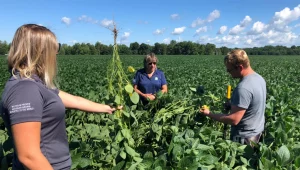Putting Superior Seed Physiology First
By DF Seeds | April 27, 2022
Raised on a seed farm near Breckenridge, Michigan, Chris Varner knows first-hand the importance of seed quality. As the president of DF Seeds, it’s her mission to ensure every seed sold to farmers is a premium product, especially with so many going to specialty markets.
With a background in seed physiology, Chris knows what makes for a superior seed. Today she is leading DF Seeds to deliver on the performance that farmers deserve.
Bringing Decades of Experience and Leadership to DF Seeds
After earning her degree in Crop and Soil Science at Michigan State University, Chris spent 17 years working in contract seed corn production and processing at Glenn Farm Seeds. It was during this time she met DF Seeds founder John Diehl, who would later personally reach out to her about taking over the business.
By then she was working at her alma mater, but she missed the seed industry. She missed the interactions with those in the business, especially the customers. So in 2009 she joined DF Seeds as Operations Manager.
Since then her expertise and leadership in seed production has continued to grow. She earned her Master’s in Seed Business and Technology from Iowa State University, served as president for the Independent Professional Seed Association, and has been the president of DF Seeds since 2015.
Helping Farmers Earn Premium Prices in the Specialty Markets
Chris joined right around the time DF Seeds began producing non-GMO, food-grade soybeans. Since then, the market for non-GMO and organic soybeans has taken off in the state. A number of companies either export to Asia or process for domestic use.
To help Michigan farmers take advantage of these markets, DF Seeds focuses on creating premium seed for them. That starts with testing new varieties here in Michigan, which has a unique microclimate thanks to the Great Lakes.
“John’s rule of thumb was always, ‘You’ve got to test it one year, before you go to production with it,’” Chris says. “That’s because maybe it looks great in the book, but you bring it here and it gets white mold really bad.”
She also wants the seed to meet the standards of the soybean processors. DF Seeds partners with local exporters and domestic users to ensure we’re providing a seed that will create a product that they want. Some of those processors will even send seed samples overseas to their buyers to evaluate them for brightness, bean size, and protein content. Thanks to these
partnerships, farmers can have confidence they’ll earn their premium on the seeds they’re planting for these markets.
Customer-First Focus
But above all, the seeds have to perform well for the farmer. Chris knows that farmers are paid on yield, so good yield performance is a top priority in evaluating new varieties. They also need to be resistant to white mold and Phytophthora Root Rot.
Bringing a variety that meets all those standards is an intensive, careful process that Chris takes seriously.
“It’s not like you’re making a recipe here and cooking something,” she says. “With plant breeding, if you add a desirable trait, usually something undesirable comes with it.”
Of the 60-plus new non-GMO lines tested in Michigan last year, Chris says only two were good enough to bring forward.
All the work Chris and the DF Seeds team does is focused on serving our farmer-customers as best as possible. That starts from the moment they open the seed bag.
“One thing we’re told often by growers who plant multiple brands is they can immediately tell the difference because of the way we size our seed,” Chris says. “It’s uniform. If it’s tagged at 2,500 seeds per pound, it all looks like 2,500 seeds per pound.”
She finds great satisfaction in providing the best seed possible to farmers, because she knows it’s their best chance for a successful season.
“Everybody that plants a seed believes in tomorrow,” she says. “You’re putting it in the ground, you’re not going to get anything out of that for a little while. So you can’t start with any type of inferiority in the seed. If you start already in the hole, you’re going to end up in the hole. As a grower, you’ve got to control what you can, and buying a high-quality seed is one of those things.”


